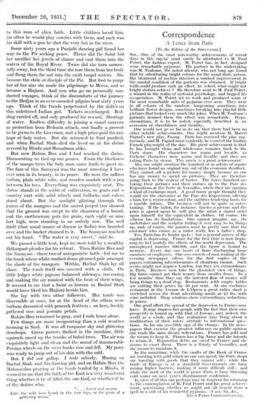Correspondence
A Letter from Paris
[To the Editor of the SPECTATOR.] S1R,—One of the most noteworthy achievements of recent days in this capital must surely be attributed to M. Paul Poiret, the fashion expert. M. Poiret has, in fact, designed some remarkable pyjamas. His partner in the undertaking was M. Toulouse, the noted alienist, who not long ago found that by substituting bright colours for the usual drab, prison- like treatment of asylum interiors a marked improvement in the mental condition of the patients was obtained. If bright walls could produce such an effect, he asked, what might not bright clothes achieve ? He therefore went to M. Paul Poiret, a wizard in the realm of sartorial psychology, and begged his co-operation. M. Poiret set to work and produced some of the most remarkable suits of pyjamas ever seen. They were in all colours of the rainbow, burgeoning sometimes into brilliant flower designs, sometimes breaking into playful little pictures that looked very much like jokes. When M. Toulouse's patients donned them the effect was remarkable. Hypo- chrondriacs, it is to be noted, especially benefited in an accession of cheerfulness and lucidity.
One would not go so far as to say that there had been no other notable achievements. One might mention M. Marcel Pagnol's new play, Fanny. Paris has received the play rap- turously, and M. Pagnol must evidently be counted the leading French playwright of the day. His great achievement is that he has brought clean and wholesome romance back to the Paris stage. His characters are warm and lovable, as l)ickens' characters were warm . and lovable, and they are taking Paris by storm. This surely is a great achievement.
Also one might mention the hundred or so artists of repute who have found an original way out of the economic deadlock. They cannot sell a picture for money simply because no one has any money to spend on pictures. They are therefore going back to the system of barter. The brave hundred are taking their pictures and their statues up to the Pare des Expositions at the Porte de Versailles, where they are opening a kind of exchange mart. A good many people thought they would see the charcutier at the Parc des Expositions offering a Liam for a water-colour, and the outfitter tendering boots for a marble Adonis. The business will not be quite so enter- taining. If the tailor, for instance, fancies a picture and the price is agreed upon he will give the artist a signed order upon himself for the equivalent in clothes. Of course, the scheme has its limitations. One cannot imagine, say, the undertaker and the sculptor finding it very easy to fix things up, and, of course, the painter must be pretty sure that the customer who comes as a tailor really has a tailor's shop.
Yes, Paris has its bright spots ; but a general survey of the capital is depressing. France for the first time is now begin- ning to feel acutely the effects of the world depression. The unemployed number 800,000, and the figure is bound to increase. Every day one hears of firms discharging large numbers of employees. One sees crowds of men waiting at the evening newspaper offices for the first copies of the papers containing advertisements of situations vacant. Such scenes might not impress London, but they are extraordinary in Paris. Business men take the gloomiest view of things. Big firms cannot get their money from smaller firms. In a few months' time they say the arrested flaw of money will bring things to a dead stop. Restaurants with empty tables are cutting their prices by 50 per cent. At one exclusive restaurant in the Avenue de L'Opera a great calico sheet is stretched across the front advertising meals at 25 frs. with wine included. Shop windows show extraordinary reductions
in prices.
One good effect the spread of the depression to France may have. It may impress her people with the fact that their own prosperity is bound up with that of Europe, and, indeed, the world as a whole, and this realization may bring about a modification of their rulers' attitude to international ques- tions. So far one secs little sign of the change. In the news- papers that exercise the greatest influence on public opinion one reads the same dreary reiterations. France has gold and she means to keep it. France has a big Army and she intends to retain it. Reparation debts are owed to France and she means to exact them. There is a Treaty of Versailles, and she means to maintain it.
In the meantime, while the vaults of the Bank of France are bursting with gold which no one can spend, the Paris shops are bursting with goods that they cannot sell ; while the trade of Europe is at a standstill Governments arc busy raising higher barriers, making it more difficult still ; and while the need of the world is peace Paris is busy throwing cold water on next year's disarmament conference.
In view of all this one perhaps may be forgiven for returning to the contemplation of M. Paul Poiret and his great achieve- ment, questioning whether we might not all benefit from a spell in a suit of his wonderful pyjamas.—I am, Sir, &c.,
YOUR PARIS CoanrsroNnENT.. •
































 Previous page
Previous page